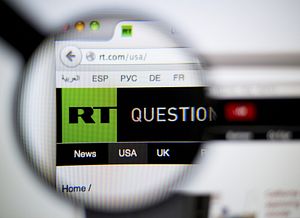To many watching relations between Russia and Central Asia, the decision to downsize Moscow’s basing agreement in Central Asia came as one of the more notable developments of 2016 so far. But the move to streamline Russian forces in Tajikistan wasn’t the lone notable development in relations between Dushanbe and Moscow last week. As reported by RFE/RL, Dushanbe announced it would deny accreditation to the Kremlin-funded RT, formerly Russia Today, media outlet. As Tajik Foreign Minister Sirojiddin Aslov explained, “Russia has repeatedly asked us [for accreditation], but Russia Today has not yet provided answers to some of the questions or doubts that we have.” Aslov didn’t detail Dushanbe’s “questions” or “doubts,” but noted that the process was ongoing, leaving the door open for potential accreditation in the near future.
Nonetheless, the move seems a pointed rebuke to Moscow – all the more as RT has been attempting to open a bureau in Dushanbe since 2014. Dushanbe’s announcement also follows Moscow’s recent decision to reportedly cut two-thirds of the staff at the Tajik bureau of Sputnik, another Kremlin-funded operation, leaving only five employees now remaining. (Sputnik exists under the umbrella of Rossiya Segodnya, which translates as ‘Russia Today,’ leading to further convolution among Kremlin-funded projects.)
The move is certainly peculiar, on a handful of fronts. Tajikistan remains one of Moscow’s few reliable partners, and maintains membership in all post-Soviet, Russia-led groupings, outside the Eurasian Economic Union. Via remittances, Moscow stands as one of Dushanbe’s primary economic pillars – though Russia’s recent recession has ontibuted to plummeting rates. And Tajikistan, in addition to hosting Russia’s largest external military base, continually boasts some of the highest favorability ratings vis-a-vis Russia, Putin, and Moscow’s global leadership.
Still, as RFE/RL wrote, “Analysts say the Tajik government is concerned by the influence of Russian propaganda[.]” And as President Emomali Rahmon entrenches his autocracy, those fears aren’t necessarily without merit. Rahmon is likely familiar with the role Russian state media played in whipping up sentiments against Kyrgyzstan’s former president, Kurmanbek Bakiyev, before he was ousted. Plus, as Rahmon related to U.S. Defense Secretary Donald Rumsfeld, Putin once instructed Rahmon to “protect Russian interests or we will find someone who can.”
Considering RT exists as one of the most pro-Kremlin outlets extant, Dushanbe’s fears about overt Russian influence aren’t without merit. Still, the decision to block RT’s accreditation will likely rankle the Kremlin and offer Moscow that much more reason to put together potential news packages critical of Rahmon’s leadership.

































